Lamufutures
Process
How could a meaningful collaboration be developed between a local youth organisation and a university program based in Switzerland?
How could research-led pedagogy contribute to local empowerment and transformation?
Our project addresses the ways in which communities of the ancient Indian Ocean port city of Lamu are managing a myriad of environmental and social challenges as they intersect with colonial legacies, infrastructural interventions, natural ecologies, and culture. Our collaboration between Critical Urbanisms students and volunteer researchers from the Lamu Youth Alliance delves into the architectural, urban, and social dimensions of change, relating past and present dynamics and global forces to debates about the future development of Lamu.
By combining the urban humanities with engaged research in partnership, we aim to build pathways for communities to negotiate their stake in projects directed from elsewhere.
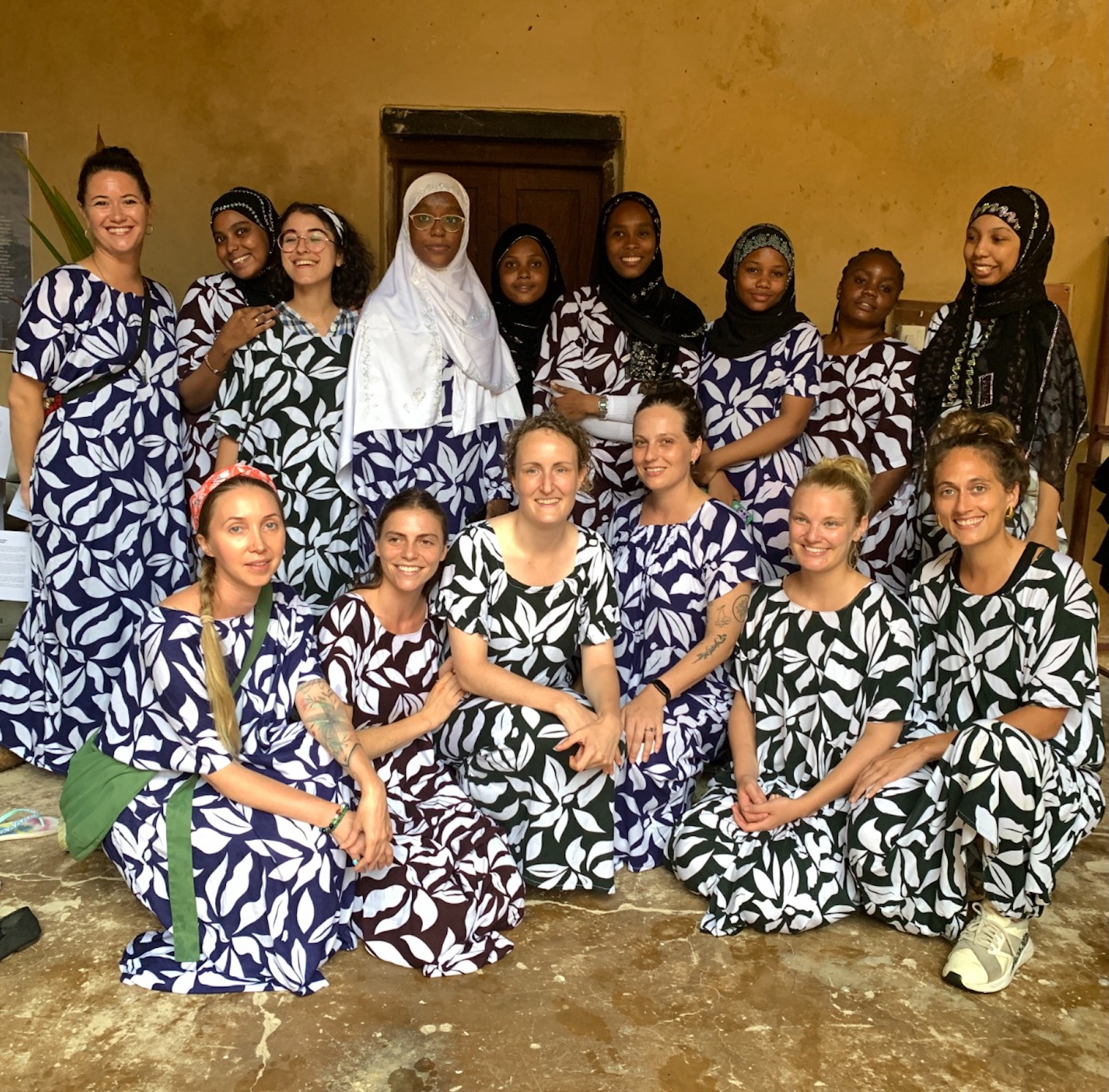
(Mis)Comunication
We learned that communication is not confined to formal language. It is built through the in-between spaces, the pauses, the shared emotions, and the willingness to create meaning together.
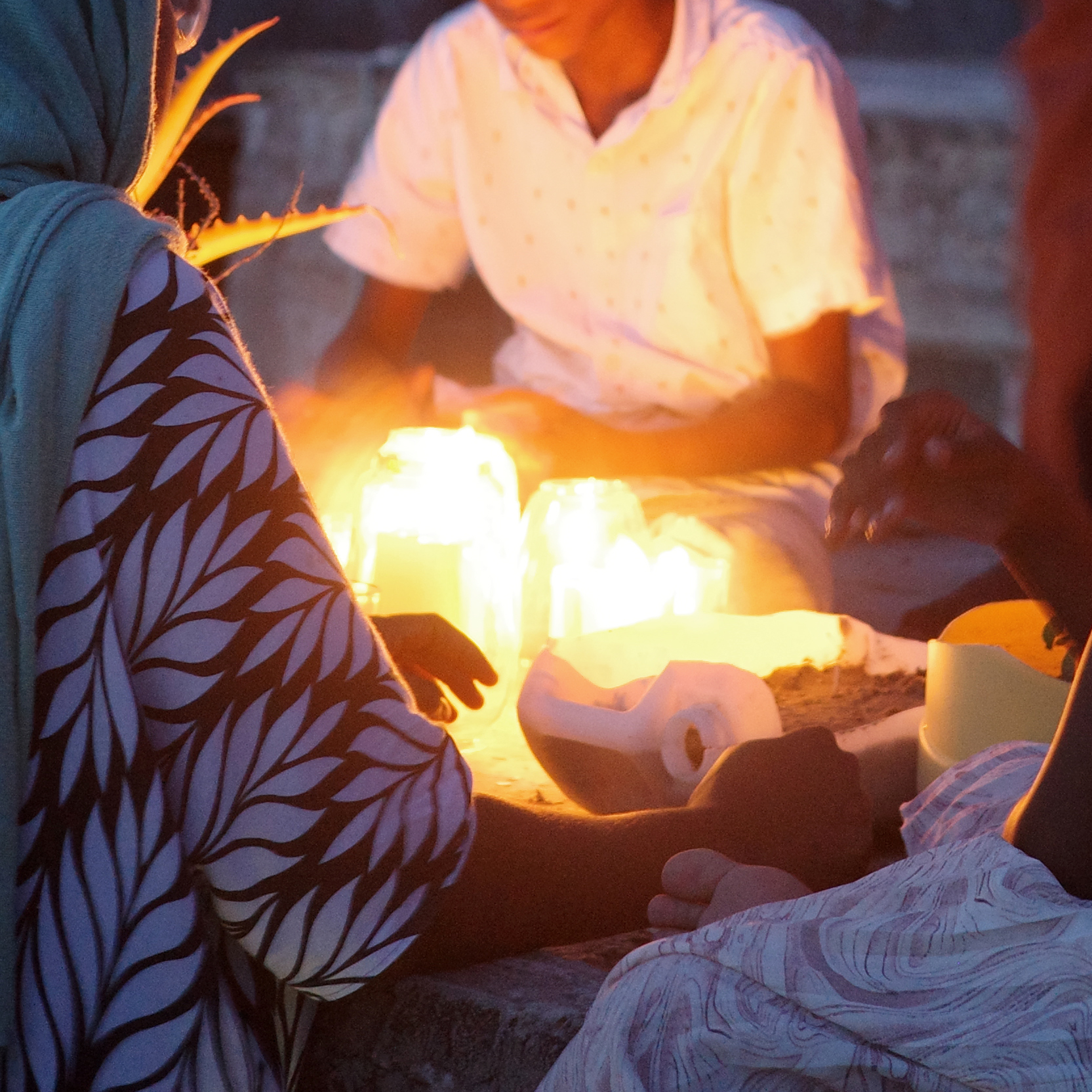
Home - Field
It’s difficult to anticipate the time and emotion invested in something that initially seems to be “outside” of research, let alone the deeper understandings that being accommodated with a “host family” can bring.
It’s difficult to anticipate the time and emotion invested in something that initially seems to be “outside” of research, let alone the deeper understandings that being accommodated with a “host family” can bring.
Partnerships
Partnerships manifested at multiple scales and took different forms, ranging from institutionally guided to self-initiated.
Partnerships manifested at multiple scales and took different forms, ranging from institutionally guided to self-initiated.
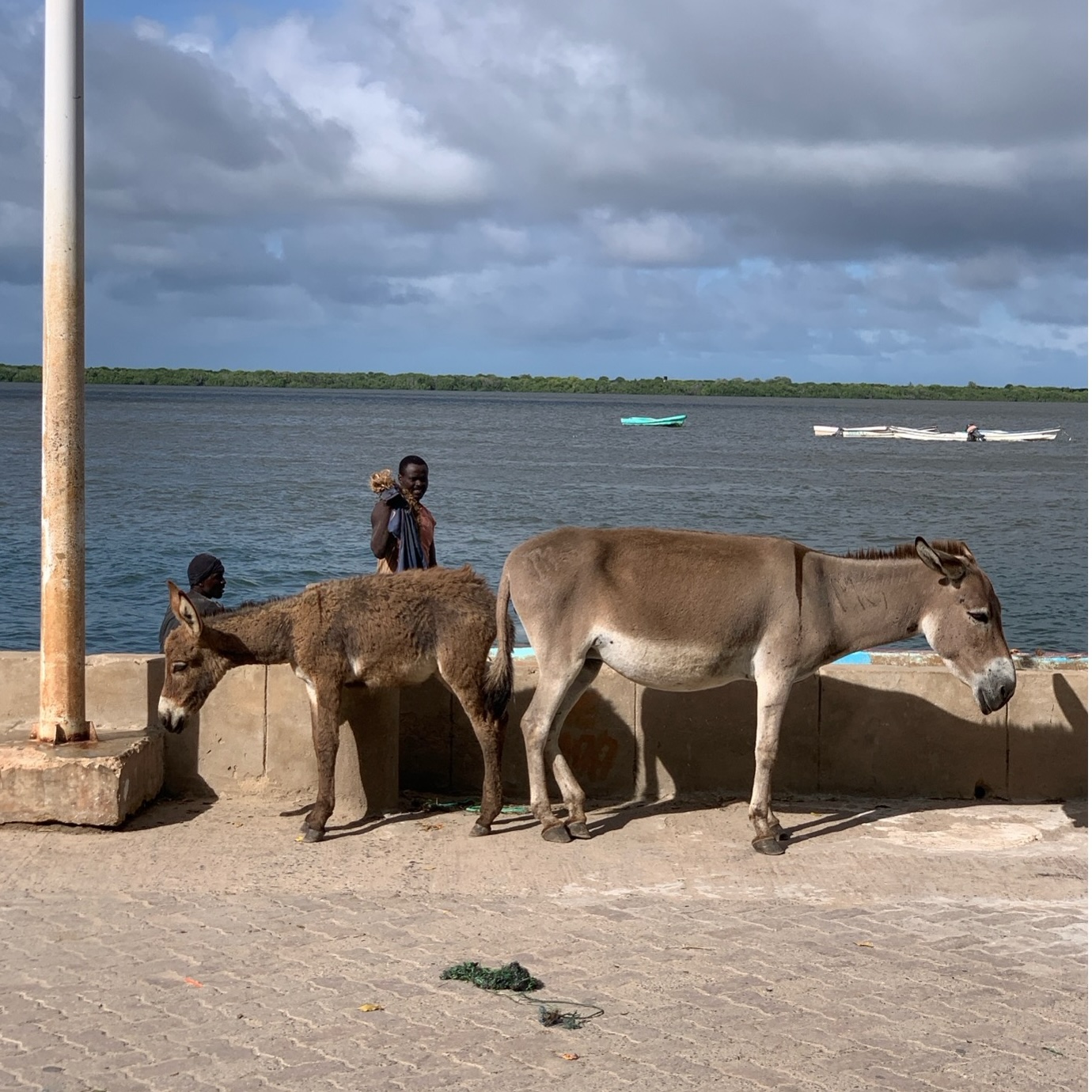
Pedagogy
Exploring donkeys' role in urban life by blending fieldwork and learning through Punda Pedagogy, a research-teaching project.
Exploring donkeys' role in urban life by blending fieldwork and learning through Punda Pedagogy, a research-teaching project.

Translation
Navigating language politics, translation, and communication, shaping inclusive, multilingual research.
Navigating language politics, translation, and communication, shaping inclusive, multilingual research.

Remuneration
Addressing ethical challenges in research compensation, emphasizing fairness, transparency, and contextual sensitivity.
Addressing ethical challenges in research compensation, emphasizing fairness, transparency, and contextual sensitivity.
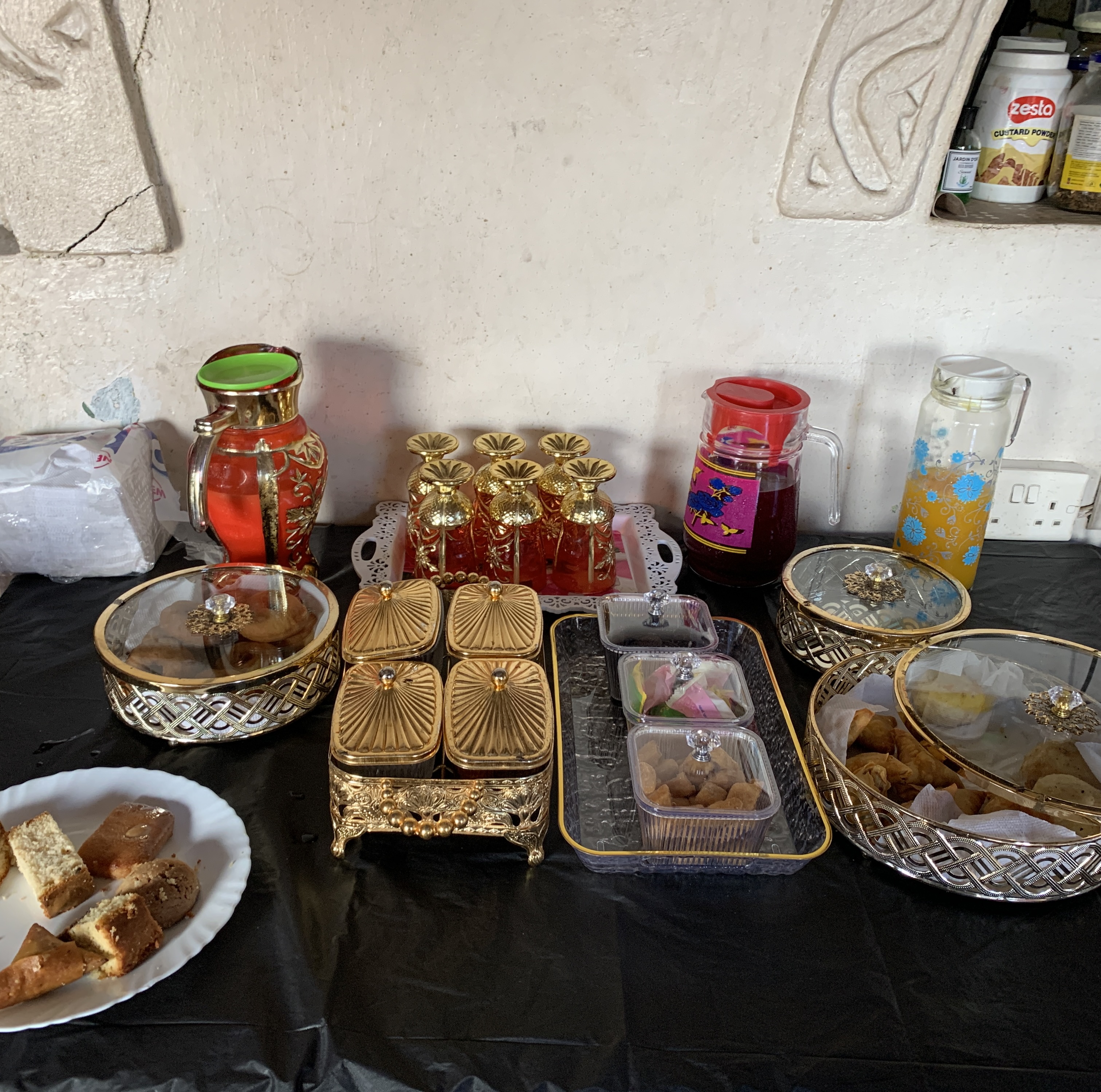
Care
Care work was a shared practice, fostering well-being, empathy, and connection within our research partnership.
Care work was a shared practice, fostering well-being, empathy, and connection within our research partnership.
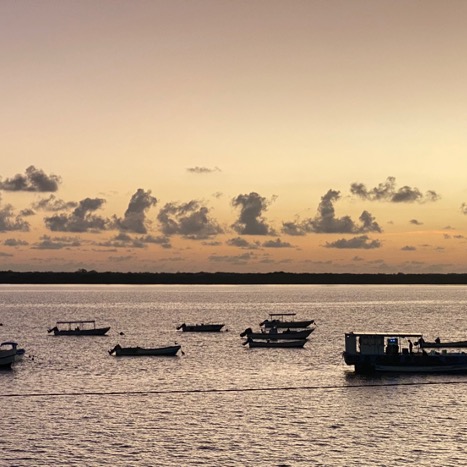


Reciprocity
Striving for ways of working and outcomes that benefit all parties involved, emphasizing mutual exchange and understanding.
Striving for ways of working and outcomes that benefit all parties involved, emphasizing mutual exchange and understanding.

Positionality
Understanding how our individual and structural positions and movements shape research processes and final outcomes.
Understanding how our individual and structural positions and movements shape research processes and final outcomes.
(Mis)Communication
In the context of international partnerships, communication challenges are to be expected. While these challenges are often attributed to language barriers, communication involves much more: it depends on styles, gestures, and ways of listening shaped by cultural backgrounds. It is only when we are placed in environments that make us question what was once automatic for us, that we become aware of these more-than-verbal aspects.
![]()
Wyioni group breaking the ice with laughter
When we began this partnership between women from different countries, we never imagined that one of our biggest obstacles would be silence. We tried to create a “common language,” resorting to a mix of English and Swahili, and a jargon of our own projects, but this did not bring us closer. Gradually, we realized that laughing at simple things, chatting about daily tasks, and navigating discomfort together were more effective ways of connecting. Thus the ice of silence began to melt.
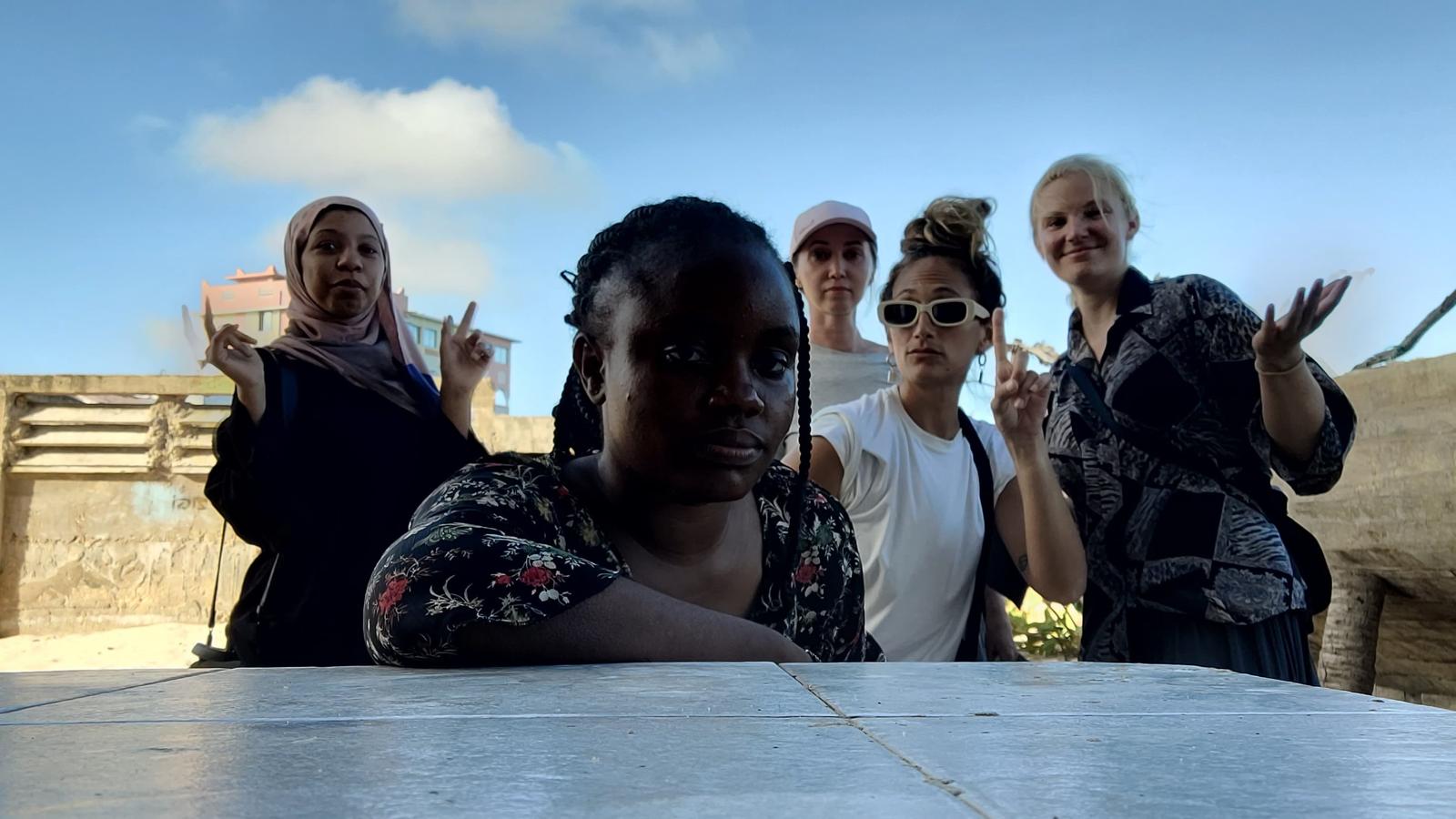
Wyioni group breaking the ice with laughter
We learned that communication is not confined to formal language. It is built through the in-between spaces, the pauses, the shared emotions, and the willingness to create meaning together.
When we began this partnership between women from different countries, we never imagined that one of our biggest obstacles would be silence. We tried to create a “common language,” resorting to a mix of English and Swahili, and a jargon of our own projects, but this did not bring us closer. Gradually, we realized that laughing at simple things, chatting about daily tasks, and navigating discomfort together were more effective ways of connecting. Thus the ice of silence began to melt.
Home - Field
Being part of an all-female cohort in 2025 opened up possibilities to us that were, based on cultural implications, more accessible to women. Male researchers, as non-relatives, can’t be easily hosted in a Swahili-Muslim household. As women, however, we had the opportunity to be accommodated with host families during our time in Lamu, which came with its own implications.
Without hesitation, most of our host families introduced us to their relatives, neighbours, and friends across Lamu. This helped us familiarise ourselves with the streets and form relationships with local people. As some of us began to recognise faces and greet people, we witnessed an ever-growing sense of safety in navigating the “field.”
Coming “home” meant returning to a space of routines, responsibilities, and roles to which we had become gradually attuned. This process inevitably took time and mental resources, but it also allowed us to engage with life in Lamu as active members of local communities, finding and shaping our roles depending on our individual situations.
Daughters
Stepping into the role of ‘daughters’ in a Swahili-Muslim household involved more than just receiving security advice, such as the best routes to take, safest places to eat, and appropriate times to come home. It also meant being introduced to people who could support us at any time of day, from trusted moto-taxi drivers to shops where we could buy necessities on credit. We learned how to navigate the gendered norms of Lamu, knowing who could be allowed into the house and which men needed to wait outside while the women of the house put on their veils before receiving them in front of the door.
Aunties
Sometimes we would become more like “aunties” or “big sisters,” as we would spontaneously help out by picking up the kids from school, baking a cake for them, or spending evenings full of fun and laughter. But beyond these voluntary responsibilities, many opportunities emerged for us to experience life as part of our host families. We were naturally included when family members attended social events. Weddings, in particular, gave us insight into the importance and distinct character of joyful, all-female spaces, as these gatherings, like much of Swahili social life, are organised along gender lines. Other occasions, such as birthdays or family outings, introduced us to the dynamics of a closely-knit extended family network.
Friends
Sometimes our presence was less defined by family commitments and more by everyday exchanges. We talked about work, clothes, relationships, shared confidences, asked for opinions, spoke about our past and recalled funny stories and trips. Sometimes we would simply spend time together late into the night. This kind of relationship created a space of intimacy and mutual listening. In those moments, we were no longer just “guests” or “researchers” but became part of the household's social life. We were close enough to be entrusted with personal stories, but also had the freedom to simply be ourselves.
Reconciling our research work, personal needs and feelings with domestic routines was at times challenging:
Amidst all the laughter, meals, cosy evenings, and late-night conversations that we shared, casual remarks provided insights into politics, culture, and society at large, which inevitably shaped how we interpreted our research. These serendipitous moments confronted us with decisions to be made, prompting us to ask ourselves to what extent the home environment was supposed to contribute to the research.
Can it ever pause?
By getting to know each other and establishing an honest basis of communication with our host families, we slowly learned to navigate these situations. By building trust and deeper relationships, it became clearer what was personal and what was a cultural practice. Understanding this required the involvement of our wider networks, including families, research partners, and local interlocutors.
Ultimately, each family setting was different. Age, occupation, and the general configuration of the family were all relevant factors, as were the personal characters of each individual. Some of us felt anchored throughout the experience thanks to our host families, while others had a shorter but nonetheless enriching encounter.
In a research environment that was emotionally intense and often uncertain, for some of us, the families provided a sense of belonging that made the stay in Lamu not only more manageable but meaningful. This was initially overlooked, but later, while turning our research into seminar papers, we realised how much would have gone unnoticed if our host families hadn’t allowed us to immerse ourselves so deeply into their lives.
![]()
Shared moments of joy
Without hesitation, most of our host families introduced us to their relatives, neighbours, and friends across Lamu. This helped us familiarise ourselves with the streets and form relationships with local people. As some of us began to recognise faces and greet people, we witnessed an ever-growing sense of safety in navigating the “field.”
The “field”, we came to realise, didn’t stop at our doorstep.
Coming “home” meant returning to a space of routines, responsibilities, and roles to which we had become gradually attuned. This process inevitably took time and mental resources, but it also allowed us to engage with life in Lamu as active members of local communities, finding and shaping our roles depending on our individual situations.
Daughters
Stepping into the role of ‘daughters’ in a Swahili-Muslim household involved more than just receiving security advice, such as the best routes to take, safest places to eat, and appropriate times to come home. It also meant being introduced to people who could support us at any time of day, from trusted moto-taxi drivers to shops where we could buy necessities on credit. We learned how to navigate the gendered norms of Lamu, knowing who could be allowed into the house and which men needed to wait outside while the women of the house put on their veils before receiving them in front of the door.
Aunties
Sometimes we would become more like “aunties” or “big sisters,” as we would spontaneously help out by picking up the kids from school, baking a cake for them, or spending evenings full of fun and laughter. But beyond these voluntary responsibilities, many opportunities emerged for us to experience life as part of our host families. We were naturally included when family members attended social events. Weddings, in particular, gave us insight into the importance and distinct character of joyful, all-female spaces, as these gatherings, like much of Swahili social life, are organised along gender lines. Other occasions, such as birthdays or family outings, introduced us to the dynamics of a closely-knit extended family network.
Friends
Sometimes our presence was less defined by family commitments and more by everyday exchanges. We talked about work, clothes, relationships, shared confidences, asked for opinions, spoke about our past and recalled funny stories and trips. Sometimes we would simply spend time together late into the night. This kind of relationship created a space of intimacy and mutual listening. In those moments, we were no longer just “guests” or “researchers” but became part of the household's social life. We were close enough to be entrusted with personal stories, but also had the freedom to simply be ourselves.
Reconciling our research work, personal needs and feelings with domestic routines was at times challenging:
Is there ever a right time to withdraw to do some reading or writing, or just to have a moment to yourself, without being rude or missing out on family life?
Amidst all the laughter, meals, cosy evenings, and late-night conversations that we shared, casual remarks provided insights into politics, culture, and society at large, which inevitably shaped how we interpreted our research. These serendipitous moments confronted us with decisions to be made, prompting us to ask ourselves to what extent the home environment was supposed to contribute to the research.
Is it ethical to include informal dinner table conversations in our field notes? When does research begin and when should it pause?
Can it ever pause?
By getting to know each other and establishing an honest basis of communication with our host families, we slowly learned to navigate these situations. By building trust and deeper relationships, it became clearer what was personal and what was a cultural practice. Understanding this required the involvement of our wider networks, including families, research partners, and local interlocutors.
Ultimately, each family setting was different. Age, occupation, and the general configuration of the family were all relevant factors, as were the personal characters of each individual. Some of us felt anchored throughout the experience thanks to our host families, while others had a shorter but nonetheless enriching encounter.
In a research environment that was emotionally intense and often uncertain, for some of us, the families provided a sense of belonging that made the stay in Lamu not only more manageable but meaningful. This was initially overlooked, but later, while turning our research into seminar papers, we realised how much would have gone unnoticed if our host families hadn’t allowed us to immerse ourselves so deeply into their lives.
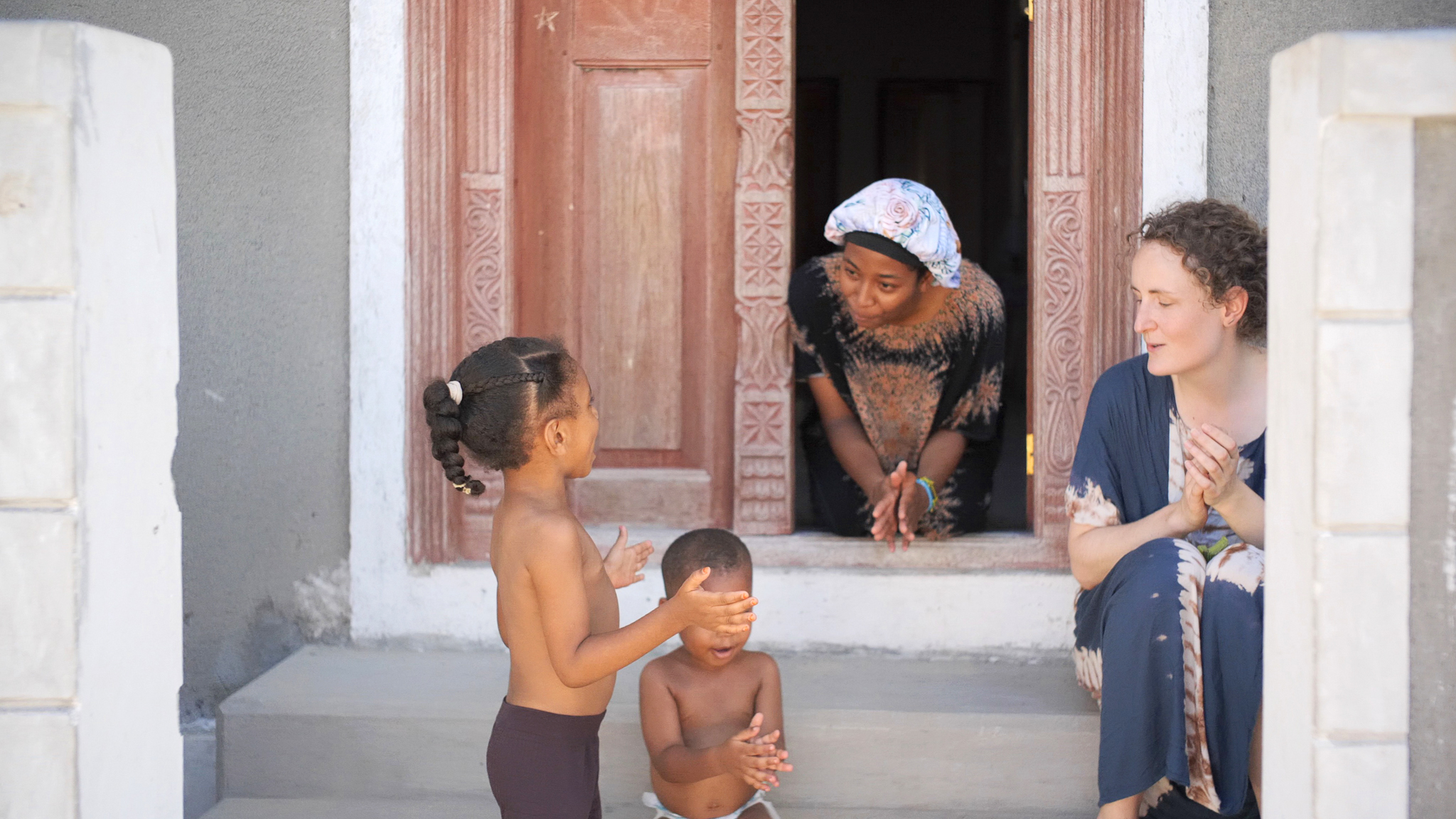
Shared moments of joy
“I wasn’t sure if I should welcome guests this year, but I’m happy that I did.”
- Host Mom/Sister
Partnerships
Arriving in Lamu, partnership described the institutional setting of the 2025 research program between the Lamu Youth Alliance (LYA) and the University of Basel. However, the word partnership says nothing about the internal heterogeneity of each partner. In reality, many of our local partners were not previously affiliated with the LYA, while the students from UniBasel were neither all Swiss, nor all from an urban studies disciplinary background. While there were age gaps of over ten years, what united us was that we all identify as women. We started forming partnerships based on each of us as individuals, and not necessarily representative of our institution's interests or disciplines.
As a partnership “across geographies,” often framed as Global North–Global South, we had to navigate assumptions — especially the expectation that Northern students were experts in bringing solutions. In reality, we were all students learning together side-by-side about how to conduct research on urban environments. For most of us, this was our first fieldwork experience. Beyond producing a piece of research for the institutional stakeholders, the partnership was enriched with different forms of learning such as inter-cultural awareness, anthropological methods, and narrative practice.
As a partnership “across geographies,” often framed as Global North–Global South, we had to navigate assumptions — especially the expectation that Northern students were experts in bringing solutions. In reality, we were all students learning together side-by-side about how to conduct research on urban environments. For most of us, this was our first fieldwork experience. Beyond producing a piece of research for the institutional stakeholders, the partnership was enriched with different forms of learning such as inter-cultural awareness, anthropological methods, and narrative practice.
While UniBasel and the LYA have had a formal contract, we as individuals created our own partnership principles, which defined our responsibilities to each other. One of these moments of creation was the collective making of a “principles collage” in the form of a Kanga – a traditional, rectangular piece of fabric.
![]()
While crafting the Kanga, we were also shaping our partnerships—trusting the process despite barely knowing each other, gaining insight into each other’s creative thinking, and producing a shared artefact within the first week.
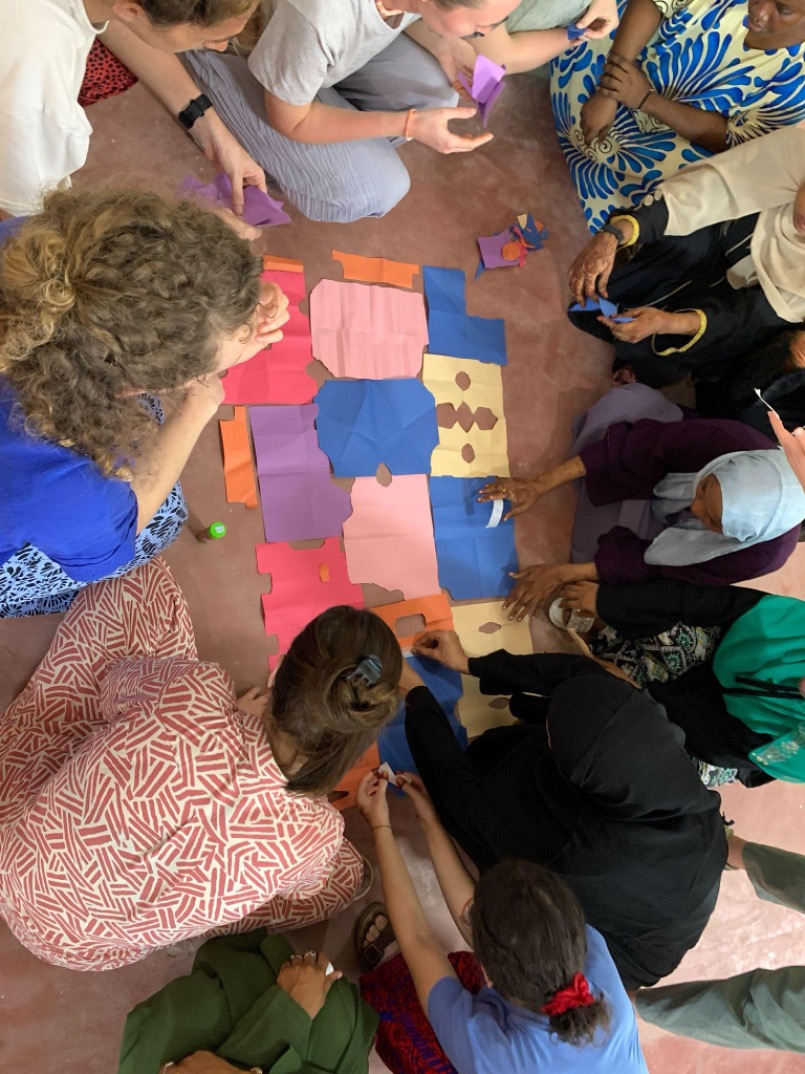
While crafting the Kanga, we were also shaping our partnerships—trusting the process despite barely knowing each other, gaining insight into each other’s creative thinking, and producing a shared artefact within the first week.
Collective Kanga: “build trust, build visions, appreciate difference, be patient with yourself and others, practice tolerance, process emotions, make decisions transparently, expand horizons, trust the process, celebrate togetherness, count on honesty.”
Getting to know each other through speed-dating prompts such as our views and values on family, gender, religion and honesty.
Another opportunity for building partnerships was Juice Night, a weekly gathering where the UniBasel women exchanged experiences, challenges, and highs and lows while drinking fresh juice in a café on the seafront. These events provided an opportunity for the UniBasel students to form partnerships and bond. Similarly to the UniBasel team, the LYA students ran their own Juice Night on a different day, giving them the same opportunity to get to know each other and share their experiences. Initially, interactions were tentative and sometimes clumsy, shaped by cultural differences, but mainly by mutual curiosity. Over time, trust developed and working relationships evolved into friendships.
![]()
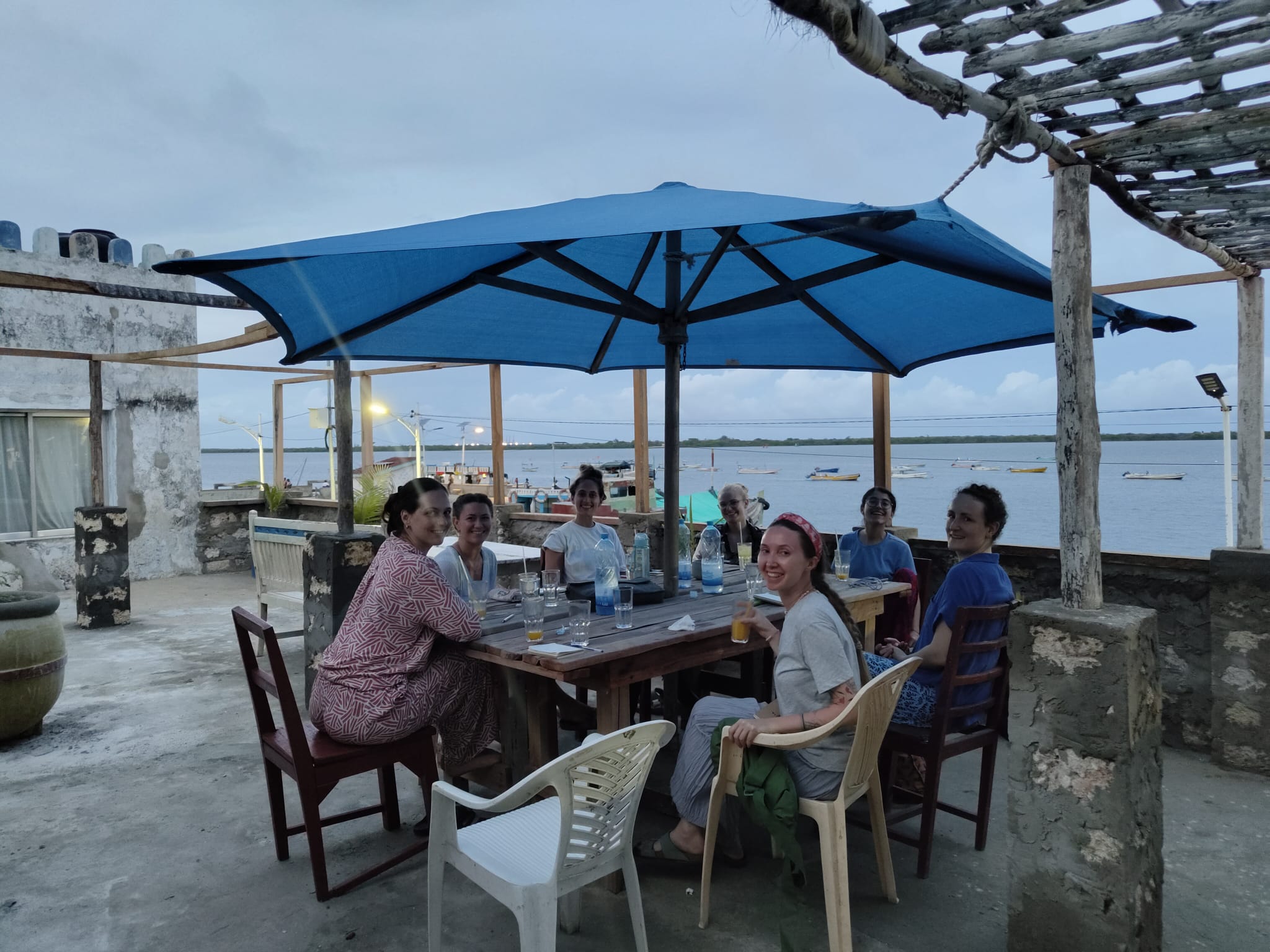
Juice Night!
Research topics were shaped more by personal connections than institutional agendas. Although LYA suggested broad themes like land and heritage, our groups found their own angles. Early discussions helped us understand each other’s goals and intentions, shaped by our diverse backgrounds and the impressions formed during our first week in the city.
Our interests ranged from women in business and religion to infrastructure, heritage, and public participation. Weekly check-ins, sometimes guided by our instructor, helped us stay aligned and ensure everyone’s desired learning outcomes were being met.
Our interests ranged from women in business and religion to infrastructure, heritage, and public participation. Weekly check-ins, sometimes guided by our instructor, helped us stay aligned and ensure everyone’s desired learning outcomes were being met.
Punda Pedagogy
Authors:
Maren Larsen
2024-2025
Maren Larsen
2024-2025
The research partnership between the Critical Urbanisms M.A. program and the Lamu Youth Alliance is fostered in the space of the University of Basel course “Site Immersions.” Unlike other university courses however, our encounters with the people and places that make up Lamu constitute the classroom where this course unfolds. Such a format demands innovative methods and practices of teaching that exceed typical instruction formats to meet diverse learning expectations and objectives.
Punda Pedagogy emerged as an experimental pedagogical project rooted in a commitment to teaching by doing research and sharing with students, by way of example, the evolution of research design, the implementation of different methods, and the analysis of findings related to Lamu’s donkeys or punda in Swahili. What began as an off the cuff, tongue-in-cheek suggestion of a potential research topic quickly became a research project in its own right, led by the 2024 course instructor Maren Larsen.
Punda Pedagogy emerged as an experimental pedagogical project rooted in a commitment to teaching by doing research and sharing with students, by way of example, the evolution of research design, the implementation of different methods, and the analysis of findings related to Lamu’s donkeys or punda in Swahili. What began as an off the cuff, tongue-in-cheek suggestion of a potential research topic quickly became a research project in its own right, led by the 2024 course instructor Maren Larsen.
Pedagogically, the real-time evolution and practice of investigating the myriad ways that donkeys affect and are affected by everyday urban life and city development on the island provided the instructional content of seminars and workshops. Teaching how research design, questions, and intentions were interacting with the realities of fieldwork to advance, alter, or challenge them opened up the space for honest discussions about the ups and downs, twists and turns that our individual and collective inquiries were taking in situ. Punda Pedagogy thus affords student researchers glimpses into different realities of how the research process unfolds and is shaped by different positions, events, and constraints that are usually not divulged in methodologies or final outputs of scholarly work. Beyond fieldwork, fieldnotes from the project were opened up and analyzed in and through creative writing exercises, providing a real-life and relatable example to guide student researchers’ own analytical and creative practices.

“The seminars and workshops were very useful since everyone gets to learn from each other and exchange ideas.” – LYA member

This research-teaching project not only accompanied student researchers as they designed, implemented, and analyzed their own research projects, but was reciprocally accompanied by students. Research and teaching integrated their feedback and insights from their own encounters with donkeys during their research, invited their participation in various fieldwork activities, and structured reflections and lessons for their own research projects. Some students voluntarily become participant-observers of the research and the research process itself, joining in on exploratory walks, observing interviews, attending events like World Donkey Day, and actively participating in the human labors that accompany and attend to the donkey lifecycle.
Preliminary reflections on donkey lifeworlds in Lamu raise more questions than answers. At once rigorous and, at times, amusing, Punda Pedagogy sheds light on the multi-species entanglements and consequences of urban development in Lamu and interrogates animals as infrastructural and ecological engineers shaping urbanity and urbanization.
Preliminary reflections on donkey lifeworlds in Lamu raise more questions than answers. At once rigorous and, at times, amusing, Punda Pedagogy sheds light on the multi-species entanglements and consequences of urban development in Lamu and interrogates animals as infrastructural and ecological engineers shaping urbanity and urbanization.
“Any dinosaurian beliefs that “creative” and “analytical” are contradictory and incompatible modes are standing in the path of a meteor; they are doomed for extinction” (Richardson and St. Pierre 960)
The priorities of Lamu’s urban development priorities at once depend upon and, too often, neglect donkeys well-being (above and beyond individual cases of cruelty or abuse). The construction of stairways to reach the rapidly urbanizing interior of the island and (curb motorbike traffic), waste management challenges, and Islamic belief systems shape the opportunities and threats that this companion species and humans pose for one another.
The lessons and questions that Lamu’s donkeys draw our attention to equally provide a broader ground for reflections about how belief systems shape encounters, how different forms of labor are exploited, valued, or neglected, and how co-habitation is maintained across difference – all of which are relevant for meta-reflections on this research partnership itself.
The lessons and questions that Lamu’s donkeys draw our attention to equally provide a broader ground for reflections about how belief systems shape encounters, how different forms of labor are exploited, valued, or neglected, and how co-habitation is maintained across difference – all of which are relevant for meta-reflections on this research partnership itself.
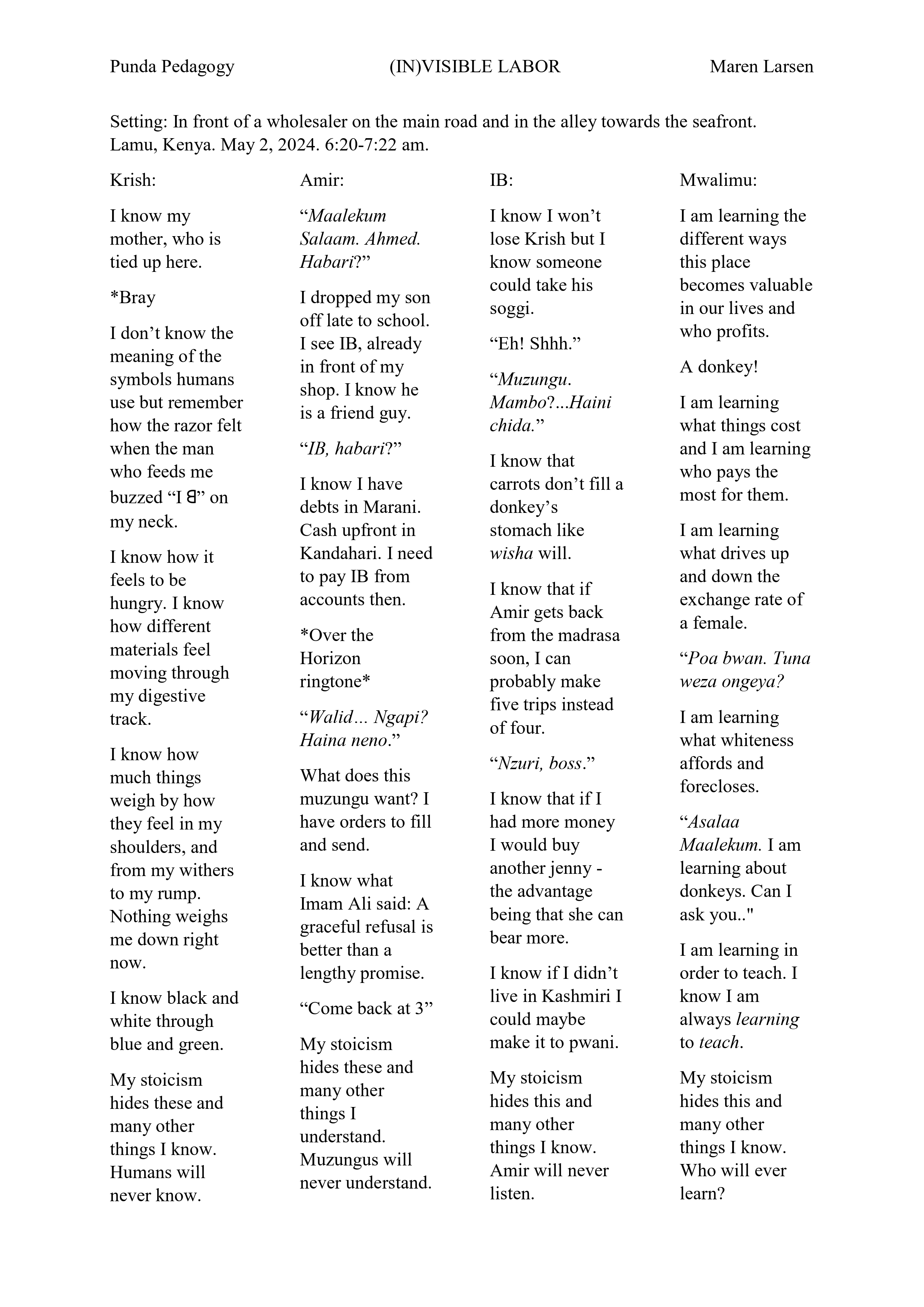
Inspired by Richardson & St. Pierre's Creative Analytical Writing Process Prompt 10 (2000, 975)